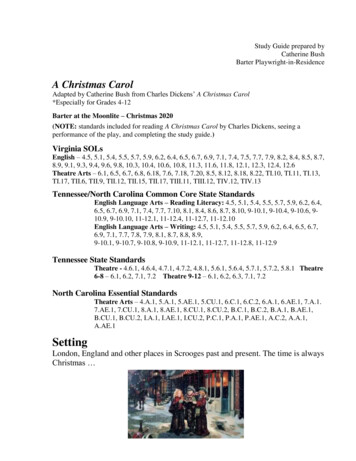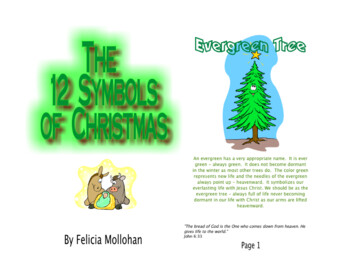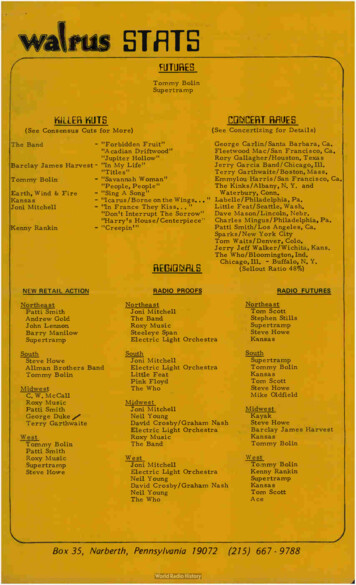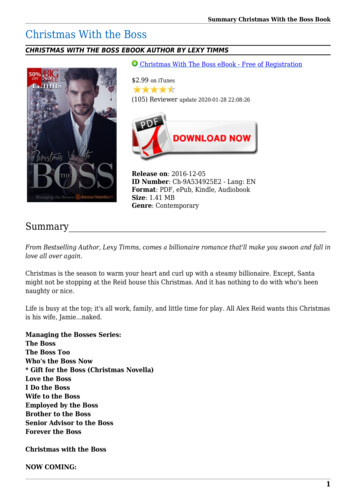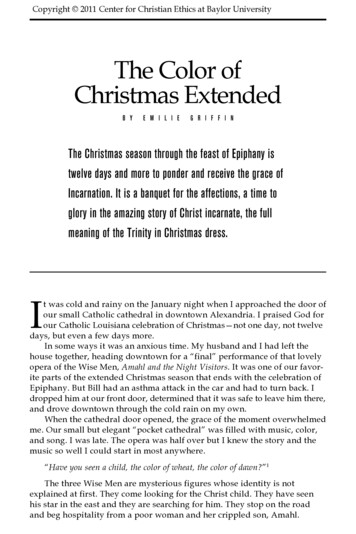
Transcription
Copyright 2011 Center for Christian Ethics at Baylor UniversityThe Color ofChristmas ExtendedB yE m i l i eG r i f f i nThe Christmas season through the feast of Epiphany istwelve days and more to ponder and receive the grace ofIncarnation. It is a banquet for the affections, a time toglory in the amazing story of Christ incarnate, the fullmeaning of the Trinity in Christmas dress.It was cold and rainy on the January night when I approached the door ofour small Catholic cathedral in downtown Alexandria. I praised God forour Catholic Louisiana celebration of Christmas—not one day, not twelvedays, but even a few days more.In some ways it was an anxious time. My husband and I had left thehouse together, heading downtown for a “final” performance of that lovelyopera of the Wise Men, Amahl and the Night Visitors. It was one of our favorite parts of the extended Christmas season that ends with the celebration ofEpiphany. But Bill had an asthma attack in the car and had to turn back. Idropped him at our front door, determined that it was safe to leave him there,and drove downtown through the cold rain on my own.When the cathedral door opened, the grace of the moment overwhelmedme. Our small but elegant “pocket cathedral” was filled with music, color,and song. I was late. The opera was half over but I knew the story and themusic so well I could start in most anywhere.“Have you seen a child, the color of wheat, the color of dawn?”1The three Wise Men are mysterious figures whose identity is notexplained at first. They come looking for the Christ child. They have seenhis star in the east and they are searching for him. They stop on the roadand beg hospitality from a poor woman and her crippled son, Amahl.
54Christmas and EpiphanyThis stunning music and lyrical text carries me back in memory to the timewhen Jesus was born. The modern Italian composer, Gian Carlo Menotti, hascaptured in a contemporary opera the intensity and wonder of the Incarnation.YBut there is another memory linked to this particular work of art. Myown first full-scale experience of Christ Jesus came in my twenties. I liketo call it a time of conversion. By grace I felt led from place to place, fromdecision to decision. Filled with a sense of wonder at the scope of Christianhistory and teaching, I accepted Jesus for myself, was later baptized andconfirmed, and embraced Roman Catholic faith sure that God’s grace hadbeen with me all along. I suspect the reason why I make this Menotti connection is that during my conversion time in New York City a determinedrevival of the cathedral play was in progress in many Manhattan churches—Anglican, Roman, and Orthodox. That was a heady time of renewal. Wehoped to recover the practices of ancient Christianity and in Milton’sphrase, to “fetch the age of gold.”2I believe this is the argument and rationale for the extended celebrationof Christmas which is today being recovered by Christians of all persuasions. Theologically, we know that every day is Christmas. If we have studied the history of the Reformation—with its odd, sometimes angry, zigzagcourse—we understand why many resisters and objectors of the Puritanstamp refused to celebrate Christmas and wanted altars stripped and holyobjects destroyed forever. Their fear of idolatry extended to imagery andfor many centuries suppressed the observance of Christmas at least for thenorthern Christian churches and sects in Europe and America. That experience is part of our legacy.Yet, the extended celebration of Christmas has remained strong withinthe liturgical churches—Anglican, Lutheran, Orthodox, and Roman Catholic. In my home city of Alexandria it is plain to me that the Roman Catholicbishop considers himself a witness to the full meaning and experience ofAdvent, Christmas, and Epiphany for the wider community. Other downtown churches, notably Emmanuel Baptist Church, have taken part in theirown extended observance of Christmas as well.Mind you, I have not discussed this with our current bishop. But everyone in our community has come to appreciate his personal love of musicand the arts, and his way of extending a welcome to everyone through thecathedral. In Roman Catholic practice the cathedral is “the bishop’s church.”In a few brief years as Bishop of the Catholic Diocese of Alexandria, BishopRonald Herzog has sponsored musical and creative events at the Cathedral,often with an ecumenical breadth. At our cathedral concerts and throughthe Red River Chorale, Bishop Herzog has emphasized gathering, rejoicing,celebrating—and reaching out to others, including those who do not fullyembrace the Christian faith.
The Color of Christmas Extended55As a lifelong Roman Catholic, I have paid attention to how the Churchhas guarded the ancient beliefs of Christians and embodied them in feastsand seasons—occasions for fully experiencing the gospel. As a writer, speaker, and spiritual director, I appreciate this aspect of Roman Catholicism.Christmas—an extended time that begins with Advent, runs throughoutthe days of Christmas, and is summed up in the Epiphany—is a banquetfor the affections, a time to glory in the amazing story of Christ incarnate,the full meaning of the Trinity in Christmas dress.YFor many believers and unbelievers, Christmas is the most importanttime of the year. Children love Christmas, and many adults justify the hugedisplay of gifts, food, and self-indulgence because Christmas is “for the children.” Christmas is designed to explore and proclaim the importance ofmemory. The Church remembers the life of Christ in this amazing, largescale festival. The feast of Christmas itself, on December 25th, is a time toimagine the birth of the Christ child, the entrance of Christ Jesus into history.As this feast is recovered some awkward facts are exposed. Scholarstoday suppose that the birth of Jesus of Nazareth was probably in summer.Because of the re-juggling of calendars the dates of these events are in flux.The Davidic lineage is clearly a factor in the biblical story, yet some scholarsquestion the Infancy Narratives. Our Scripture study reveals that the genealogies given in the Gospelsdo not line up neatly. Similar questions are raisedIn that heady time of renewal, we hoped toabout astronomical history.What do we know aboutrecover the practices of ancient Christianitythe star the Wise Men followed? Who were the Wiseand in Milton’s phrase, to “fetch the age ofMen anyhow? Why areRoman Catholics so configold.” This is the rationale for the extendeddent about naming themwhen their names—Caspar,celebration of Christmas which is beingMelchior, and Balthazar—are not actually in the Bible?recovered by Christians of all persuasions.Are these our primaryquestions as the Christmasseason spools out? Notusually. Most contemporary people, even faithful believers, experience theChristmas season—of whatever length—as a time of busy preparation, ofgift-giving, of hassle, sometimes of exhaustion. Travel may be involved.Coordination is needed. Long awaited visits and elaborate plans may notwork out just right. Even in a time of peace there are fits of temper andannoyance. Some relatives and neighbors may feel excluded, unwelcome.
56Christmas and EpiphanyPeople bring their worries and anxieties into the Christmas season—what towear, what to buy, what to bring—how to keep up with the neighbors’ moreaffluent or less affluent standards. Will I be welcome? Will I fit in? Will soand-so’s mother or father like and accept me? Will I feel, in some unexplainedway, that there is really “no room for me at the inn”?Today’s Christian teachers, pastors, and spiritual leaders are consciousof these anxieties. They know that Christmas is a holy time for some andjust an extended bash for others. On another level they know the hunger ofthe human heart for acceptance and for a sense of identity. The longer celebration of Christmas, which harks back to the earliest days of Christianity,extends this sense of anticipation and this yearning for home. The wholedrama of salvation is acted out in the season that begins with Advent, movesthrough the twelve days of Christmas, and ends with the January feastsincluding Epiphany.I cherish the Advent readings in the liturgical calendar because they liftus into an almost angelic place. Here is the first reading for the first Sundayof Advent:In days to come,the mountain of the Lord’s houseshall be established as the highest mountainand raised above the hills.All nations shall stream toward it;many peoples shall come and say:“Come, let us climb the Lord’s mountain,to the house of the God of Jacob,that he may instruct us in his ways,and we may walk in his paths.”Isaiah 2:1-5 (NAB)3I love the long-distant prophetic tone, the sense that God is with usthen, long ago, now, right away, and in the days to come. Somehow, it isenough to take my mind off things, worrisome but global things like climatechange, which are way beyond my control. God is in charge of it all and heloves us with an inexhaustible love.Christmas is a festival of homecoming and the Christmas story is clearabout the “real” meaning of Christmas. Home is not a physical place but aGod-space. Christmas—not one day but the whole celebration—reminds usof our deep welcome into the heart of God.The story of Jesus is what matters. As Christian missionaries throughoutthe world have told us, it is the story that converts. The full celebration ofChristmas embeds the story in almost every day of this long season. We beginour observance with Advent, which proclaims not only the first but the second coming of Christ. Advent helps us to look forward to a messianic time.
The Color of Christmas Extended57When we reach December 24 and 25 we think, ah, Christmas is here atlast. But no, Christmas is more than one day even though Christmas Eveand Christmas Day may feel like the ultimate in sacred, holy time. But asthe early church fathers knew, the pull of the secular will always be withus. Christmas allows us to feel and know how the entrance of Christ Jesusinto our world transforms us, gradually and imperceptibly. Our ordinaryliving is changed by grace. We become God’s people. No, we become God’speople again and again. I always love those words of John Henry Newman:“The most perfect Christian is to himself but a beginner .”4 Newmanaccepts, and blesses, our human failings and imperfections, our tendencyalways to be “falling back” or “falling down.” Our simple human conditionis what plagues us. But Jesus comes to make it right.Our worship on Christmas Eve and Christmas Day gives us a sense thatour childhood hopes are still alive, that the child Jesus has them well in hand,that new hopes and new beginnings are possible.But these two great feasts, the Vigil of Christmas and Christmas Day,are only opening a door. It is something like the cathedral door that openedfor me when the Menotti music poured out. A flood of grace is waiting forus as we enter into worship and into the heart of Christ. When we come intothe cathedral we are looking for the child in the manger, the Christ child inMary’s arms. We find him, yes. But if we are open to it, we find Christ in hisfullness, the second person of the Trinity. We find God the Father and theHoly Spirit as well. The simplicity of Jesus, Mary, and Joseph, the simplicityof the animals and theshepherds, all these areimages both of our imperChristmas is a festival of homecomingfection and of God’s willingness to come to usand the Christmas story is clear about thewhere we are.We live in the middle“real” meaning of Christmas. Home is not aand the muddle of things,and Jesus comes to find usphysical place but a God-space. The wholethere.celebration of Christmas reminds us of ourThe longer observanceof Christmas is a good idea.deep welcome into the heart of God.Because of it, the full rangeof Christ’s personality takeshold of us. The many attributes of his identity become part of our desire for a new beginning.Most people who relate to the twelve days of Christmas think about“calling birds and turtle doves.” Actually, this lively song commemorates aninteresting episode in Christian history and has its own cunning revelations.But the liturgical feasts of Christmas as presently observed in Catholicchurches are sometimes a bit less merry and more challenging. The feast of
58Christmas and EpiphanyStephen which falls on the day after Christmas is a good example. Traditionhas it that this feast was placed next to Christmas in order to pull us backfrom the high of sensible pleasures, to enhance our sense of the mystical andour yearning for heaven. Maybe it does that for some. You must enter deeplyinto the story of Stephen and the Scriptures appointed for the feast in orderto get the connection. Another great feast that falls within the twelve daysis that of the Holy Innocents. This feast commemorates a horrifying eventdescribed in Matthew 2:13-18. Still another daunting observance is that ofPeter and Paul. In this holy day, emphasis is often placed on their martyrdom. Why, the theologians ask, do we focus on suffering and death in themidst of a happy time of visiting and celebration?Various explanations are offered. Some say the liturgical calendar grewin a hodge-podge kind of way. Nowadays the common interpretation issomewhat mystical and influenced by John’s gospel. The Christmas season,like other great extended festivals of Christianity, reflects both light anddarkness. God is sovereign over both, but in our humanity we continue toexperience the ups and downs of ordinary living, the joys and the sorrows,the brokenness of the human condition.YIn January 2011, just as the Christmas season was ending, I had an intenseexperience of spiritual formation and transformation. I was teaching andoffering informal spiritual direction at the Renovaré Institute. About fortyparticipants were on hand and our emphasis was on Christian history as itaffected spiritual transformation and instruction. Participants were frommany different Christian churches and groups. For some the liturgical tradition was a novelty even though its ancient structures are still felt in modernWestern societies.On January 6th and 7th I led the morning prayers. I thought I was following a simple, comfortable prayer format that would be easy for everyone.Instead I found that the emphasis I put on the Epiphany—the interpretationof the Wise Men and their long journey to find the Christ child—was newand powerful for our assembled group. Old as it was, ancient as the dawnof time, God’s Word became new and powerful to me again as I stood upto lead the morning prayers.This chance to bring the message was both a high and a low. I felt exaltedby God’s Word, lifted up by the joy of interpretation, and very unworthy, allat the same time.The power of God’s grace seemed to penetrate those teaching days.When I returned to my home city in Louisiana I was filled with gratitude.At the closing dinner some participants told me that though they werelifelong Christians and students of the Bible, they had never had the visit ofthe Wise Men fully explained and taught to them before. Even the names,Caspar, Melchior, and Balthazar, were a pleasing novelty. They thanked me
The Color of Christmas Extended59with an almost childlike pleasure for this larger interpretation. Inwardly,I was grateful for this validation of my work. I resolved to try to live better,to accept the full reality and blessing of God’s grace.When I came back to Louisiana, the Feast of Epiphany should have beenover. But it wasn’t. There was a little bit more to the story.YAt home I found my own life, very real, very ordinary. My gifted husband had been soldiering on without me through the cold and rainy Januarydays. He was struggling with asthma and other challenges. I was wrestlingwith health challenges and life challenges, too.But when he met me at the airport I could see the joy. A new year wasbeginning for both of us and nothing could dim our sense of God’s grace.So there was an extra meaning for me when the cathedral door openedand the color of Christ’s extravagant presence poured out.The church was not crowded. Some of us were rain-soaked. Wet umbrellas were everywhere. The Wise Men in their tall gorgeous turbans and silken hats were magical, but a little worried about how to deal with the winterrain. Yet our small cathedral was filled with the grace of God. I felt a senseof God’s abundant mercy. It was enough to take us through storm and trouble in search of the amazing Christ.When the opera ended, we all trundled over to the reception where wewould have hot punch and cold punch and sandwiches and cake—and thebeauty of each other. Along the way, as I inched down the rain-soaked ramp(built for people like mewho are handicapped andrely on a cane) I passed theThe Christmas season reflects both light andchild Amahl and one ortwo Wise Men. In the story,darkness. God is sovereign over both, but inAmahl had left his crutchbehind to follow the Lordour humanity we continue to experience theJesus.ups and downs, the joys and the sorrows, theI felt sustained and lifted up by the healing powerbrokenness of the human condition.of grace. I thought I hopedwe would get better. Thedoctors said it was just aflu infection and would go away in the next few weeks and as warm weathercame again. But inwardly I had felt a spiritual healing with Amahl, who roseout of poverty to meet the mystical visitors and to join their search of themystical child, the gift of grace.“The Child we seek holds the seas and the winds on his palm.The Child we seek has the moon and the stars at His feet .
60Christmas and Epiphany“He’s fed by Mother who is both Virgin and Queen.Incense, myrrh, and gold we bring to His side, and the Eastern Star is ourguide.”5The music had flooded my heart. The words of Menotti’s opera wereetched in memory and would remain.Throughout Christian history the creative impulse of Christians to tellstories about Jesus Christ and his kingdom has festooned and extended theholy season till it permeates our consciousness and wonder in the darkestand most sunless time of the year. The light of Christ penetrates our darkness. The color of Christ’s presence spills out of the church doors and floodsinto our sometimes discouraging world.NOTES1 Gian Carlo Menotti, Amahl and the Night Visitors: Vocal Score (New York: G. Shirmer,Inc., 1986 [1951]), 28.2 John Milton, “On the Morning of Christ’s Nativity” (1629), section II (“The Hymn”)XIV.3. Speaking of the angels’ song announcing Christ’s birth, the poet says “For if such aholy song / enrap our fancy long, / time will run back and fetch the age of gold.”3 Scripture texts marked NAB are taken from the New American Bible with Revised NewTestament 1986, 1970 Confraternity of Christian Doctrine, Washington, D.C. and areused by permission of the copyright owner. All Rights Reserved. No part of the NewAmerican Bible may be reproduced in any form without permission in writing from thecopyright owner.4 John Henry Newman, “Christian Repentance,” Parochial and Plain Sermons, III (SanFrancisco: Ignatius Press, 1997 [1831]), 542.5 Menotti, Amahl and the Night Visitors, 31-32.Emilie Griffinis a writer, editor, and founding member of the Chrysostom Society, a writersgroup.
people again and again. I always love those words of John Henry Newman: "The most perfect Christian is to himself but a beginner ."4 Newman accepts, and blesses, our human failings and imperfections, our tendency always to be "falling back" or "falling down." Our simple human condition is what plagues us. But Jesus comes to make .





